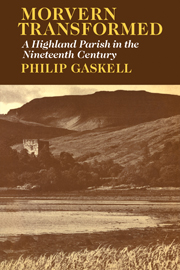Book contents
- Frontmatter
- Preface
- Preface (1980)
- Introduction (1980)
- Contents
- List of Plates
- Maps
- Abbreviations
- 1 MORVERN IN 1800 BETWEEN THE DEVIL AND THE DEEP BLUE SEA
- 2 THE IMPACT OF EFFICIENCY 1800–1850 PEOPLE REMOVED, LAND IMPROVED
- 3 HOLIDAY HOME 1850–1870: THE ESTATE AS A CONSTRUCTIVE HOBBY
- 4 RICH MAN'S CASTLE 1870–1900: THE ESTATE AS A MACHINE FOR SPORT
- APPENDICES
- BIBLIOGRAPHY
- Index
- Plate section
3 - HOLIDAY HOME 1850–1870: THE ESTATE AS A CONSTRUCTIVE HOBBY
Published online by Cambridge University Press: 05 January 2010
- Frontmatter
- Preface
- Preface (1980)
- Introduction (1980)
- Contents
- List of Plates
- Maps
- Abbreviations
- 1 MORVERN IN 1800 BETWEEN THE DEVIL AND THE DEEP BLUE SEA
- 2 THE IMPACT OF EFFICIENCY 1800–1850 PEOPLE REMOVED, LAND IMPROVED
- 3 HOLIDAY HOME 1850–1870: THE ESTATE AS A CONSTRUCTIVE HOBBY
- 4 RICH MAN'S CASTLE 1870–1900: THE ESTATE AS A MACHINE FOR SPORT
- APPENDICES
- BIBLIOGRAPHY
- Index
- Plate section
Summary
OCTAVIUS SMITH AND ACHRANICH
A very different sort of person now enters the story, a wealthy and original member of the English intellectual aristocracy, who had little in common with his fellow-proprietors in Morvern except, perhaps, strength of character. Octavius Smith's father, William Smith (1756–1835), after a successful career in wholesale grocery in London, became the first Unitarian to sit as a member of parliament, where he represented Sudbury, Camelford and (chiefly) Norwich for forty-six years, an abolitionist, an emancipator and an outstanding philanthropist in earlynineteenth-century radical politics. His ten children—none of whom lived for less than sixty-eight years, and whose average length of life was eighty-two—included Benjamin, also a distinguished politician and the father of Leigh Smith the explorer and of Madame Bodichon the benefactress of Girton College; Frances, the mother of Florence Nightingale; and two unmarried daughters, Patty and Julia, who were favourites in intellectual society. Two other daughters married respectively G. T. Nicholson of Waverley Abbey and John Bonham Carter; and there were connections by marriage with the Verneys, the Lushingtons and the Cloughs.
William Smith, having been obliged to meet election expenses amounting to £40,000 (towards which he sold a notable collection of pictures), had nothing left for his children; his whole estate, which he bequeathed to his wife, came to no more than £5,000.
- Type
- Chapter
- Information
- Morvern TransformedA Highland Parish in the Nineteenth Century, pp. 57 - 80Publisher: Cambridge University PressPrint publication year: 1968



